Little Joe Hernandez Interviews
Little Joe Hernández, from Temple, Texas, was born in 1940 and began his career as a musician in the late fifties, trying to break into the surging rock-and-roll market. His first record, released in 1958, was a two-part rock tune titled, “Safari, Part I & II.” The group was called “The Latinaires,” later renamed “Little Joe & the Latinaires.” Finding it impossible to break into the rock-and-roll market, Little Joe turned increasingly to the music favored by Texas-Mexican orquestas (dance bands), which consisted of Mexican/Latino genres like the bolero, danzón, mambo, as well as the homegrown polca-ranchera, a genre that combined the European polka with Spanish-language lyrics. Under the influence of the Chicano Movement, a political upheaval that rippled through Mexican American communities in the 1960s and ‘70s, Little Joe changed his band’s name from “The Latinaires” to “Little Joe y la Familia,” in 1970.
The leading band in a culturally powerful Chicano musical style known as “La Onda Chicana,” La Familia became an emblem of a Chicano musical sensibility, especially with his introduction of a thoroughly bimusical polca-ranchera style that synthesized a Mexican, ranchero sound with a distinctly jazz-oriented one. This pathbreaking development was first achieved in a landmark LP, “Para la Gente,” released on his own label (Buena Suerte Records) in 1972. With this stroke of genius Little Joe y la Familia arguably became the most influential musical group in the history of Mexican America.
Now recognized as the foremost icon of “la onda chicana,” Little Joe remained an active musician/singer well into the 2010s.
Introduction by Manuel Peña, 2017
- Little Joe Hernandez Interview 1991 00:00
Interviewee: Little Joe Hernandez
Interviewer: Manuel Peña
Date: Nov 23, 1991
Location:
Language: English
- Little Joe Hernandez Interview 1993 00:00
Interviewee: Little Joe Hernandez
Interviewer: Manuel Peña
Date: May 6, 1993
Location:
Language: English
This is an interview originally recorded for research purposes. It is presented here in its raw state, unedited except to remove some irrelevant sections and blank spaces. All rights to the interview are reserved by the Arhoolie Foundation. Please do not use anything from this website without permission. info@arhoolie.org


